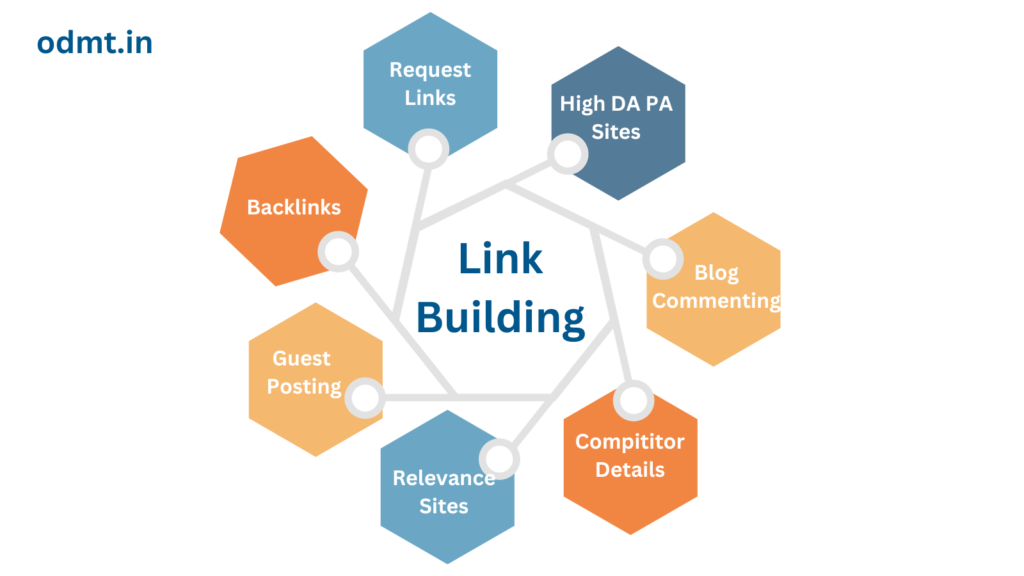What is Link Building?
Link building is the process of acquiring backlinks (inbound links) from external websites to your own site. These links serve as “votes of confidence” that help increase website authority, improve search rankings, and drive organic traffic.
Search engines like Google consider backlinks as one of the top ranking factors—the more high-quality, relevant backlinks a website has, the higher it is likely to rank in search results.
Why is Link Building Important?
✅ Improves Search Rankings: Google sees backlinks as a trust signal. Websites with high-quality backlinks tend to rank higher in search engine results.
✅ Drives Organic Traffic: Links from other websites bring direct referral traffic to your pages.
✅ Builds Authority & Trust: Getting links from authoritative websites (like news portals, government sites, and educational websites) establishes credibility.
✅ Speeds Up Indexing: Search engines use backlinks to discover new pages faster.
Types of Backlinks
1️⃣ Dofollow Links (Good for SEO)
- Pass SEO value (link juice) and help in ranking.
- Example: A blog post linking to your article using natural anchor text.
2️⃣ Nofollow Links (Neutral for SEO)
- Do not pass SEO authority but can still drive traffic.
- Example: Links from social media, forum comments, and some business directories.
3️⃣ High-Quality Backlinks (Best for SEO)
- Links from trusted, high-domain authority (DA) websites.
- Example: A mention from Forbes, Wikipedia, or an educational (.edu) site.
4️⃣ Low-Quality Backlinks (Harmful for SEO)
- Links from spammy, irrelevant, or black-hat sources.
- Can result in a Google penalty if manipulated.

How to Do Link Building?
Here are 10 powerful link-building strategies to earn high-quality backlinks in 2025:
1. Guest Blogging (Write for Other Websites)
- Write high-value content for authoritative websites in your niche.
- In return, they allow you to insert a backlink to your site.
- How to do it?
- Find high-authority blogs in your niche.
- Pitch a unique blog topic to them.
- Write an informative, non-promotional article with natural links to your content.
2. Broken Link Building (Find & Replace Dead Links)
- Find broken links on high-authority websites and suggest your content as a replacement.
- How to do it?
- Use tools like Check My Links (Chrome Extension), Ahrefs, or SEMrush.
- Identify broken links on competitor sites.
- Contact the website owner and recommend your relevant content as a replacement.
3. Skyscraper Technique (Upgrade Popular Content)
- Improve an existing high-ranking article and earn links.
- How to do it?
- Find a top-performing article in your niche.
- Create an updated and better version (more data, images, videos).
- Reach out to websites linking to the original post and ask them to link to your improved version.
4. HARO (Help a Reporter Out)
- Get featured in news websites like Forbes, Business Insider, and The New York Times.
- How to do it?
- Sign up on HARO (www.helpareporter.com).
- Respond to journalists’ queries with expert opinions.
- If accepted, they include your name and a backlink to your website.
5. Digital PR (Press Releases & Brand Mentions)
- Press releases & online PR help get links from media outlets.
- How to do it?
- Create newsworthy announcements about your company.
- Submit press releases to PR platforms like PRWeb, BusinessWire, and PR Newswire.
- Get backlinks from news websites that publish your PR.
6. Infographic Link Building
- Websites love visual content and are likely to share it with a backlink.
- How to do it?
- Create an informative infographic using Canva or Visme.
- Share it with bloggers & journalists in your niche.
- Submit it to infographic directories like Visual.ly and Infographic Journal.
7. Resource Page Link Building
- Many websites have resource pages that link to useful content.
- How to do it?
- Search Google: makefileCopy code
site:.edu “resources” + your keyword site:.gov “helpful links” + your keyword - Reach out to website owners and suggest your content.
- Search Google: makefileCopy code
8. Business Directories & Citations
- List your business on high-quality directories to gain backlinks.
- How to do it?
- Submit to directories like Google My Business, Yelp, Bing Places, Clutch.co, and Trustpilot.
- Ensure NAP (Name, Address, Phone Number) consistency.
9. Community Engagement (Forums & Q&A Sites)
- Answering industry-related questions builds credibility and earns links.
- How to do it?
- Join forums like Quora, Reddit, and Stack Exchange.
- Answer questions with valuable insights and insert relevant links to your content.
10. Social Media & Video Marketing
- Social signals indirectly improve rankings and increase link-sharing opportunities.
- How to do it?
- Share blog posts on Twitter, LinkedIn, Facebook, and Pinterest.
- Create YouTube videos with links in descriptions.
Best Practices for Successful Link Building
✔ Focus on Quality, Not Quantity: 10 backlinks from high DA websites (DA 80+) are better than 100 from low DA sites (DA 20-30).
✔ Avoid Spammy & Paid Links: Buying links can result in Google penalties.
✔ Use Natural Anchor Text: Avoid exact-match keyword stuffing. Use natural phrases.
✔ Track Backlinks with SEO Tools: Use Ahrefs, Moz, or SEMrush to monitor backlinks.
✔ Diversify Link Sources: Get backlinks from blogs, news sites, directories, and forums.
Conclusion
Link building is a critical SEO strategy that improves search rankings, authority, and organic traffic. By using ethical and strategic link-building techniques, you can create a strong backlink profile that helps your website rank higher in search results.
Would you like a custom link-building strategy for your website? 🚀
